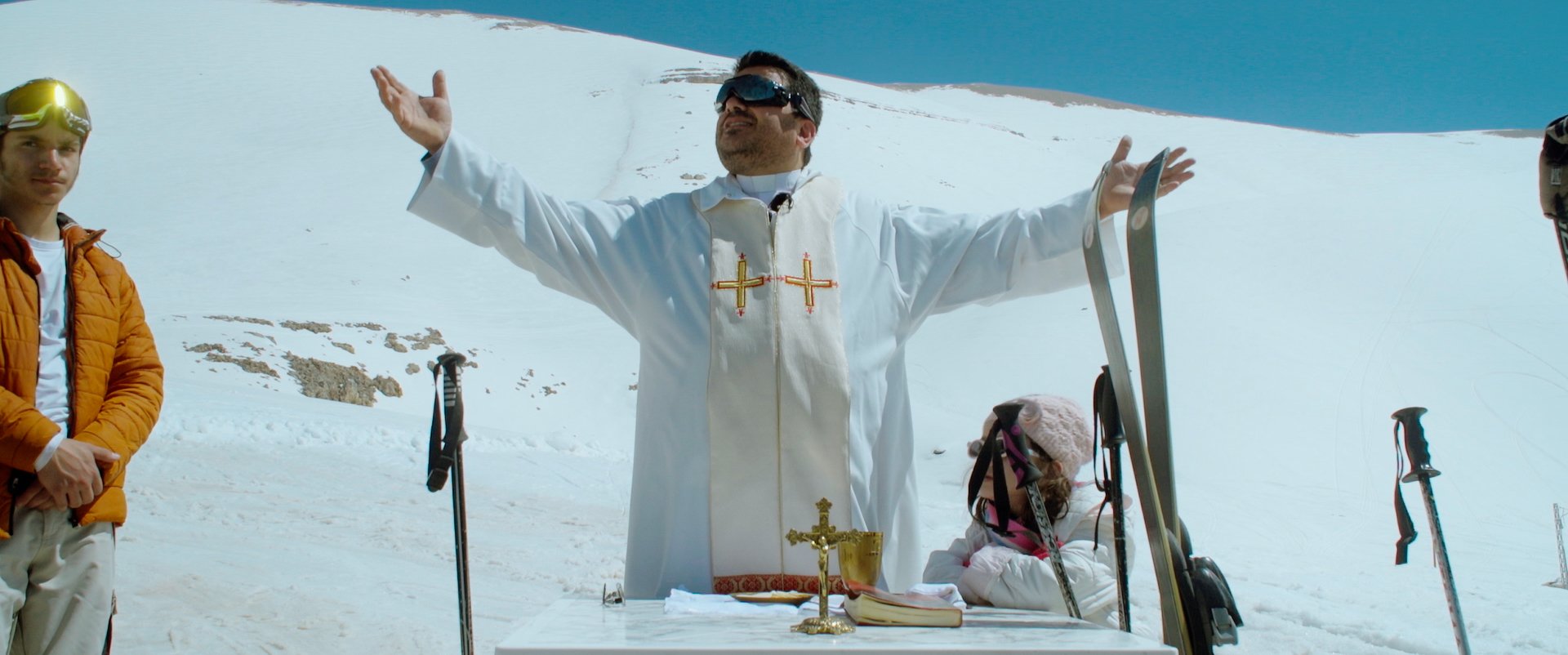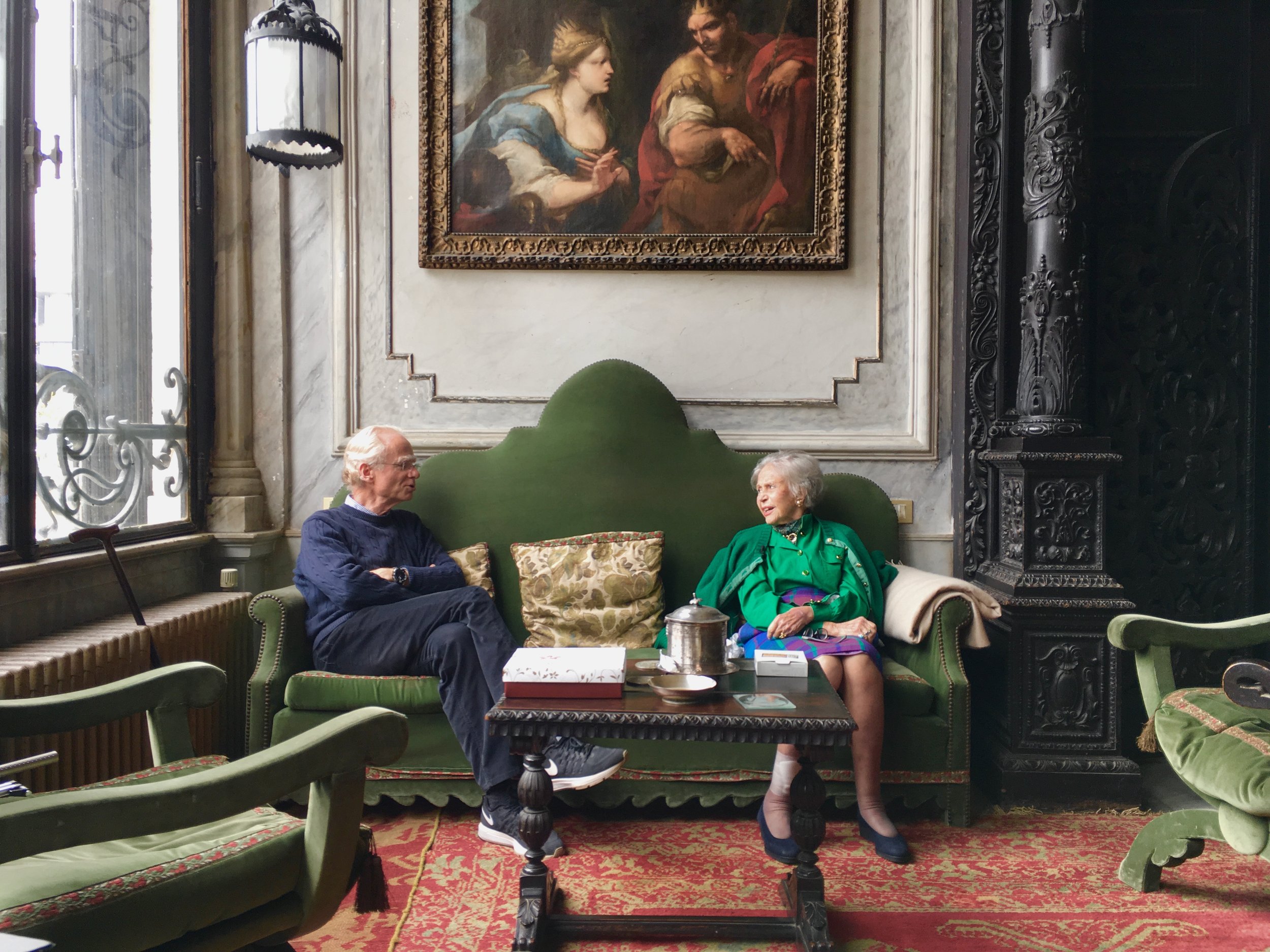Filmmaker reflects on his inside glimpse of Lebanese elite
By Sean Mathews
Church service at Cedars Ski Resort, Lebanon. Photo courtesy of Èric Motjer
Perched on a mountaintop overlooking Beirut skyscrapers and the glistening Mediterranean, the Torbay family sits on their patio brainstorming how to market spaghetti as a fast food item at their mall near the Syrian border.
“We can sell it in a big bowl,” the 80 year old family patriarch says, “Cheaper than a hamburger.”
It is scenes like this, and ones involving a snow-suit clad priest with ski googles saying Mass in the Cedars Ski resort that stand out in Èric Motjer’s documentary, Beirut Le Vie en Rose.
“I knew I had to film this guy,” Motjer told Levendeia, referring to the priest. “At the start of the film you find yourself, as a viewer, in the most bizarre situation; seeing a priest in the middle of all this snow, in the Middle East.”
That bizarreness and sense of other worldliness is the essence of Beirut Le Vie en Rose.
Viewers of the film find themselves swept up in the elite life of three long established Lebanese Christian families and for 73 minutes bounce between scenes of decedent galas and interviews in Ottoman era drawing rooms with members of the Sursock, Eddé , and Torbay families.
Roderick and Lady Cochrane Sursock in Sursock Mansion. Photo courtesy of Èric Motjer
Motjer started the project in 2013 after the chance encounter of his colleagues with Viviane Eddé, a socialite and journalist who is featured in the documentary and serves as a hub between the various families.
“They returned to Barcelona after meeting Viviane’s friends in Beirut and just knew we had to film them,” Motjer said. “I stayed with the families for many weeks during filming and I started to understand the way they see the world, which was my main concern.”
Whether in Motjer’s interviews with Roger Eddé or Lady Cochrane Sursock and her son Roderick, these aristocratic, Levantine perspectives of the world are brought clearly to view.
The heads of these families, working to preserve their ancient names and uphold the country’s cosmopolitanism lament the loss of Lebanon’s standing as a stronghold of business and tourism from the days before the civil war.
“We are not really representative of Lebanon today. So I am trying to preserve a bit of how life was in the past,” Roderick Sursock says in the film.
Still, with glimpses of guests at decadent house parties entertained by belly dancers and multilingual dinner parties, it seems the old Beirut finds a way to hang on.
“It’s true that Lebanon, when it comes to nightlife was the Paris of the Middle East. But it hasn’t changed,” says Roger Eddé to the backdrop of techno music and disco lights.
For Motjer, filming families who are no strangers to the press, and at times, flamboyant to say the least, posed its own unique challenges.
“As documentary film makers we are not used to filming rich people. We focus on people with social and economic problems more,” he said. “So we noticed that the families were one-hundred percent conscious of being filmed.”
Indeed, either in the backdrop of lush gardens or reminiscing as they stumble through photo albums, the subjects of the film seem to be acutely aware of the camera.
“We accepted this and in the film, you just know they are acting,” Motjer says smiling, “but from seeing them acting, you can imagine how they are in their private lives.”
Another challenging aspect for Motjer was deciding how to deal with the poverty of Lebanon surrounding these elites.
Throughout the film, the only glimpse the viewer may get of another world is from behind the silver icons of Rolls Royces and Jaguars which the families drive amidst the backdrop of concrete jungles spilling over with urbanization.
View of Beirut street. Photo courtesy of Èric Motjer
“I wanted to find a way to show their elite life, without showing how poor other people were. I didn't want to rely on poor people just to show rich people,” Motjer said.
Motjer highlighted as well that trying to define the film and its elite subjects along clear cut lines was challenging.
“They understand that they live in a kind of different world from the other people. At the same time, they don't hold the major economic power any more.” He adds, “All the characters have one thing in common, they are all less represented (in Lebanese society) than 20 or 30 years ago.”
Hanging on to the past for these families is about preserving their native villages, advocating for public spaces in a country nearly devoid of parks, and preserving Beirut’s historical architecture from rampant urbanization and over-development.
“They forget everything in this country. There is no past…and there is no future if there is no memory,” Lady Cochrane Sursock says in an interview scene.
The complexity of life in Beirut comes most strikingly to bear when the film transitions from a decadent late night party scene, where rousers are entertained by a scantily clad belly dancer and host in golden smoking jacket, to a church procession.
“This documentary was done in Beirut because it was the only place that it could be done; just because of the city and the situation of the country,” Motjer said.
Perhaps it is the vast dichotomy even within the characters’ lifestyles which makes the film hard for audiences not familiar with the easy malleability of life in the Levant.
Torbay Family. Photo courtesy of Èric Motjer
Motjer told Levendeia, “I think Western societies are very used to polarized societies. This film is not about judging, but giving the viewer information to think about this complex situation.”
By letting the camera and subjects of the film tell the tale, Motjer’s film not only offers a beautiful glimpse into a complex lifestyle, but gives those not familiar with Beirut and the Levant much to think about
As the filmmaker said, “I believe films should focus more on asking questions than giving answers.”



